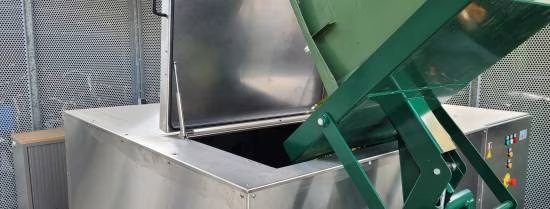Banana peels, coffee grounds, pizza crusts, wrinkled tomatoes... From now on a myriad of leftovers will end up in EUR's brand-new composting machine. The machine, which became operable this week, quickly turns organic waste into nutritious compost. With the purchase of this sustainable asset, the EUR takes a big step towards less CO2 emission.
How does the composting machine work?
The composting machine is a product of a Dutch organization called Ecocreation and made in the Netherlands. The machine is energy efficient and simple to use. It’s filled up every day with organic waste from the Food Court, the Pavilion and other university buildings. The machine can process up to 280 kg of waste per day and turns it into compost in 24 hours. This is possible because of a natural process.
Inside the composting machine is a bacterial culture, which is activated by the presence of warmth, oxygen and nutrition. The organic waste serves as a source of nutrition for the bacteria. The composting machine slightly warms up the waste and tosses it to add oxygen. This activates the bacteria inside the machine, which convert the waste into a valuable organic substance, a.k.a. compost. Ventilators make sure that moisture is extracted. A simple but effective system.
Less waste = less emission
Thanks to the composting machine, waste can be reused as compost for the plants in the campus garden. But there is another essential reason that EUR has opted for a composting machine. The use of the machine reduces waste volume and weight by a staggering 85 percent! That’s because organic waste consists largely of water. The machine takes out the water, making the waste volume much more compact. Therefore, there is much less waste that needs to be transported from campus.
“ We no longer need eight garbage trucks per month to transport organic waste, but just one."
Ben van der Kemp
Project Leader Real Estate & Facilities
This significantly reduces CO2 emissions and waste processing costs. In this way, the composting machine contributes to the sustainability objectives of EUR and to our ambition to become one of the most sustainable universities in the Netherlands.
The composting has already started
This week, the composting machine was first taken into service. This means that the first containers of organic waste have already been processed! Behind the scenes, the RE&F department has worked very hard to organize the introduction of the composting machine. For instance, they analyzed how waste flows on campus should be managed in order to make optimal use of the composting machine. Furthermore, the transport and destination of the compost needed to be arranged.

How does this impact campus life?
The composting machine is located next to the garbage containers at the rear of the Sanders Building. The machine is sheltered by a roof which is made of recycled materials from an old bicycle shed. Scared you will smell or hear the machine before seeing it? That’s not necessary. The machine is pretty quiet, and you can hardly smell the presence of it. In fact, it is mainly the current containers that sometimes spread an annoying stench. Thanks to the composting machine, less containers are needed. In addition, the compartment of the machine in which the composting is done is closed off, which means there is less trouble from pests.
Did you know you can also easily make compost at home?
Egg shells, coffee grounds and banana peels turn out to be a golden combination that will please your plants. Here is what you need to make a nutrient-rich smoothie for your plants:
• coffee grounds (from one pot)
• 2 banana peels
• 3 eggshells
• water
• blender
Mix up the ingredients in your blender and pour the mixture into a bottle. It doesn't look like much when you've mixed it, but it gives your (indoor and outdoor) plants a big boost. Pour two tablespoons of the stuff on the soil and the plants will be grateful. The banana peels contain potassium, the coffee grounds are full of minerals and the eggshells are bursting with calcium. Bonus: The caffeine in the coffee grounds keeps snails away from your precious plants.
- More information
Do you have any questions about the composting machine? Please email them to tomorrowscampus@eur.nl.

